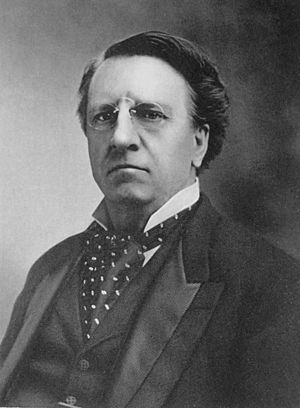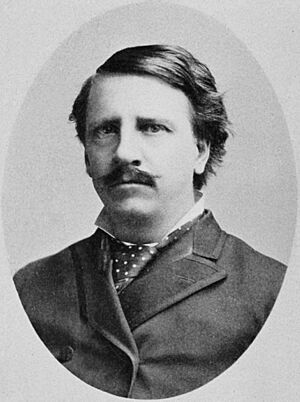John Coit Spooner facts for kids
Quick facts for kids
John C. Spooner
|
|
|---|---|
 |
|
| United States Senator from Wisconsin |
|
| In office March 4, 1885 – March 3, 1891 |
|
| Preceded by | Angus Cameron |
| Succeeded by | William F. Vilas |
| In office March 4, 1897 – April 30, 1907 |
|
| Preceded by | William F. Vilas |
| Succeeded by | Isaac Stephenson |
| Member of the Wisconsin State Assembly from the St. Croix district |
|
| In office January 1, 1872 – January 1, 1873 |
|
| Preceded by | Revel K. Fay |
| Succeeded by | David C. Fulton |
| Personal details | |
| Born | January 6, 1843 Lawrenceburg, Indiana |
| Died | June 11, 1919 (aged 76) New York City, New York |
| Resting place | Forest Hill Cemetery Madison, Wisconsin |
| Political party | Republican |
| Spouses |
|
| Children |
|
| Parents |
|
| Education | University of Wisconsin–Madison |
| Signature | |
| Military service | |
| Allegiance | |
| Branch/service | Union Army |
| Years of service | 1864–1866 |
| Rank | |
| Unit |
|
| Battles/wars | American Civil War |
John Coit Spooner (born January 6, 1843 – died June 11, 1919) was an important politician and lawyer from Wisconsin. He served as a United States Senator for two terms. He was a member of the Republican Party. By the 1890s, he was known as one of the "Big Four" Republicans. These four senators made many important decisions in the Senate.
Contents
Growing Up in Wisconsin
John Coit Spooner was born in Lawrenceburg, Indiana, on January 6, 1843. His father, Philip Loring Spooner, was a lawyer and a judge. In 1859, John moved with his family to Madison, Wisconsin.
He went to local schools and then attended the University of Wisconsin. He earned a degree in 1864. While in college, he joined a fraternity called Psi Upsilon. He also became a member of Phi Beta Kappa, an honor society.
Serving in the Civil War
During the Civil War, John Spooner joined the Union Army. He started as a private in the 40th Wisconsin Infantry. This unit served for three months.
After his service, he went home and gathered a group of his college friends. They formed Company A of the 50th Wisconsin Infantry. John became their captain. When the war ended, he was promoted to brevet major.
Starting His Career
After the war, Spooner worked for the Wisconsin Governor, Lucius Fairchild. He was the governor's private secretary. Later, he became the governor's military secretary. He also served as a brigadier general in the Wisconsin Militia.
From 1865 to 1867, he studied law with his father. He became a lawyer in 1867. Soon after, he was appointed assistant attorney general for Wisconsin. He held this job from 1869 to 1870. In 1869, the University of Wisconsin gave him an honorary Master of Arts degree.
In 1870, Spooner moved to Hudson. He practiced law there until 1884. He became very good at railroad and business law. He worked as a lawyer for several railway companies. In 1872, he was a member of the Wisconsin State Assembly. He also served on the University of Wisconsin Board of Regents from 1882 to 1886.
Becoming a U.S. Senator
John Spooner was elected to the United States Senate as a Republican on January 27, 1885. He served from 1885 to 1891. He tried to be re-elected but lost to William F. Vilas. During this time, he led the Senate Committee on Claims.
He was a delegate for Wisconsin at the Republican National Conventions in 1888 and 1892. In 1892, he ran for governor of Wisconsin but did not win. After this, he moved back to Madison and continued practicing law.
In 1897, Spooner was elected to the U.S. Senate again, taking Vilas's place. He was re-elected in 1903. He served in the Senate from 1897 until he resigned in 1907. He chaired the Committee on Canadian Relations and later the Committee on Rules.
As a Senator, Spooner helped create important laws. He supported a part of the Sherman Antitrust Act. This law allowed the government to take action against large companies like Standard Oil. He also helped create a civil government for the Philippines after the Spanish–American War. He wrote the Spooner Act, which allowed President Theodore Roosevelt to buy the land for the Panama Canal Zone.
Spooner was very popular among Republicans. He was offered three different jobs in the President's Cabinet. He turned down offers to be Secretary of the Interior, Attorney General, and Secretary of State.
Spooner and fellow Wisconsin Senator, Robert M. La Follette, were known rivals. Spooner did not agree with La Follette's progressive ideas. Spooner was more conservative. He also did not like the idea of direct primary elections. He believed that direct primaries would cause politicians to focus only on themselves.
Later Life and Passing
After leaving the Senate, John Spooner practiced law in New York City. In 1910, he started a law firm called Spooner & Cotton. He worked there until he passed away.
John Spooner died on June 11, 1919, in Manhattan, New York. He was buried in Forest Hill Cemetery in Madison.
Awards and Recognition
John Spooner received several honorary degrees. The University of Wisconsin gave him an honorary Doctor of Law (LL.D.) degree in 1894. He also received LL.D. degrees from Yale University in 1908 and Columbia University in 1909.
His Family
In 1868, John Spooner married Annie Main. They had four children together. Three of their children lived to adulthood: Charles Philip Spooner, Willet Main Spooner, and Philip Loring Spooner. Their son John C. Spooner passed away when he was young.
 | Jewel Prestage |
 | Ella Baker |
 | Fannie Lou Hamer |


